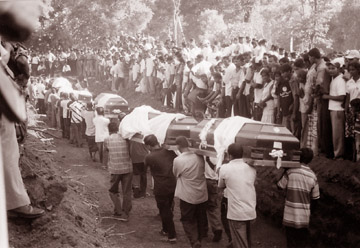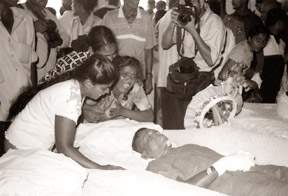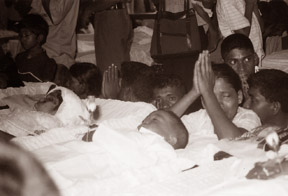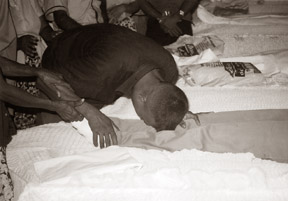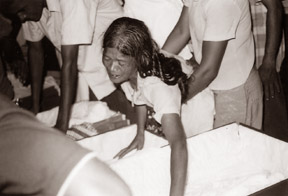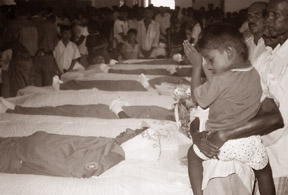|
observer |
|
|
|
|
|
OTHER LINKS |

|

|

|
|
Carnage at Kebithigollewa: Their last journey...our endless tears, pain
It was a scene that could rival Dante's inferno. The mangled bodies of men, women and children laying in the hospital morgue. The Kebithigollewa Hospital morgue looked liked a virtual cool room of mass bodies. Air was heavy with the smell of blood; the scenes of despair, shock, pain and mourning could only suggest a hellish intervention. A man cries in pain clutching the lifeless body of his son - a barely three-year-old kid. A lady desperately searches for her husband with whom she got into the bus not knowing the impending horror. Later she found his body laying in the hospital morgue. A young woman, her body bandaged of blast injuries feeding her infant in her hospital bed. Her one year old kid had a miraculous escape from the blast which ripped through the packed bus. It was a death ride for the passengers in the bus, even before the Tigers set off the two Claymore mines. They were travelling to pay their last respects to a home guard, a relative, who himself a victim of the LTTE gunmen. And for the expecting women attending a weekly maternity clinic at the Kebithigollewa Hospital, this over- crowded bus was the only mode of public transport. But, their journey was not to be.
A cruel claymore mine took toll on that ill-fated morning as sun rose across the road stretch on the isolated Kebithigollewa environs. The final toll was sixty-four with another ninety wounded. The passengers were aware that their villages on the border of the Tiger controlled territory were no longer safe despite the fact that the CFA is on hold, at least in a technical sense. The Tigers were on the prey in the nearby jungles and stepping up attacks against villagers. But, the villagers were left with no choice, but to continue their lives. But, these hapless men and women did not predict a carnage of the proportion of last Thursday at the hands of LTTE cadres. Ugly face of terrorismFor any sane mind, it is obvious that the Tigers targeted civilians and the Claymore blast was a deliberate act on the part of the LTTE. A joint Army and home guard road clearing patrol had passed the site only minutes ago. It has been a routine for the past six months since the LTTE stepped up attacks against the security forces. It was only after road clearings that public transport was permitted. But, it is now suspected that the Tigers planted two claymore mines, after the road was cleared and knowing very well that the bus was full of passengers heading for Kebithigollewa. The Tigers planned for maximum casualties by blowing off two mines. The carnage set off by the two mines, killed 64 passengers and wounded over 90 people. Among the deceased, 28 were women and 15 were children below ten. Laying on his hospital bed at Anuradhapura, Amith Gayan (18) was desperately seeking to know the fate of his relatives. Most of his extended family were in the ill-fated bus travelling to attend the funeral of the slain home guard, who was also a family relation. The ill-fated SLTB bus of the Kebithigollewa depot was to run from Vihara Halmillawa to Kebithigollewa. As the bus arrived in Yakawewa, it was already packed. But a few dozen of passengers were waiting there for the bus, which was the only public transport available to these poor villagers in this remote corner of the North-Central Province. Brutal aftermathIt was any way a day of mourning as villagers were to bury a fellow villager, a home guard Wasantha Kumara who was shot dead by the LTTE gunmen on Tuesday when he was returning home from duty. W.Karunaratne got into the bus from Yakawewa with his wife and the child to attend the funeral of Wasantha Kumara. "The bus was so packed with people, that I was desperately clutching the pole with a foot of mine on the footboard. Men had to climb down to the footboard to make room in the bus for women and children," said Karunaratne at the Anuradhapura Hospital where he lies, his legs paralysed after the blast. The bus ride on that sunny morning turned out to be a journey of no return. As the bus was passing Ihala Halmillawa, LTTE cadres were waiting for the bus full of passengers, detonated two claymore fragmentation mines, each weighted 15-20 kg. The first blast killed the driver. And with the second blast, the bus was thrown aside and it dragged on without any direction for 70 meters and fell aside. The blast threw Karunaratne out of the bus. He saw the bus fall aside. Past horrors of LTTE brutalities flashed in his mind. In a desperate effort to save his life, he tried to move into the jungle to avoid preying eyes of possible LTTE gunmen. But, he found, his legs were paralysed and crawled into the nearby shrubs. In the past, Tigers descended on the sleepy villages in the dead of night and butchered hundreds of hapless civilians. Karunaratne feared the LTTE men in the vicinity would repeat the past practice, butchering the survivors of the claymore blast.Karunaratne was laying in the shrubs, waiting for rescue help. The Army road patrol which was about a mile away heard the blast and rushed to the place. The injured and dead were transported to Kebithigollewa Hospital. Karunaratne shouted for help, when he saw the Army team. A home guard took him back to the road. As rescuers searched for survivors, Karunaratne looked for his wife and son. He could not stand on his own, he was clutching a window of the fallen bus. He fainted and when he regained consciousness, he found himself in the hospital. By Thursday afternoon, he was yet to know the fate of his wife and children. Hospital authorities were checking whether they were among 70 wounded now being treated at the Anuradhapura Hospital. Two bombs scattered families, robbed lives of 64 innocent men, women and children. Shock and despair of a community echoed in the heavy air of Kebithigollewa as it buried the dead in a mass funeral. |
